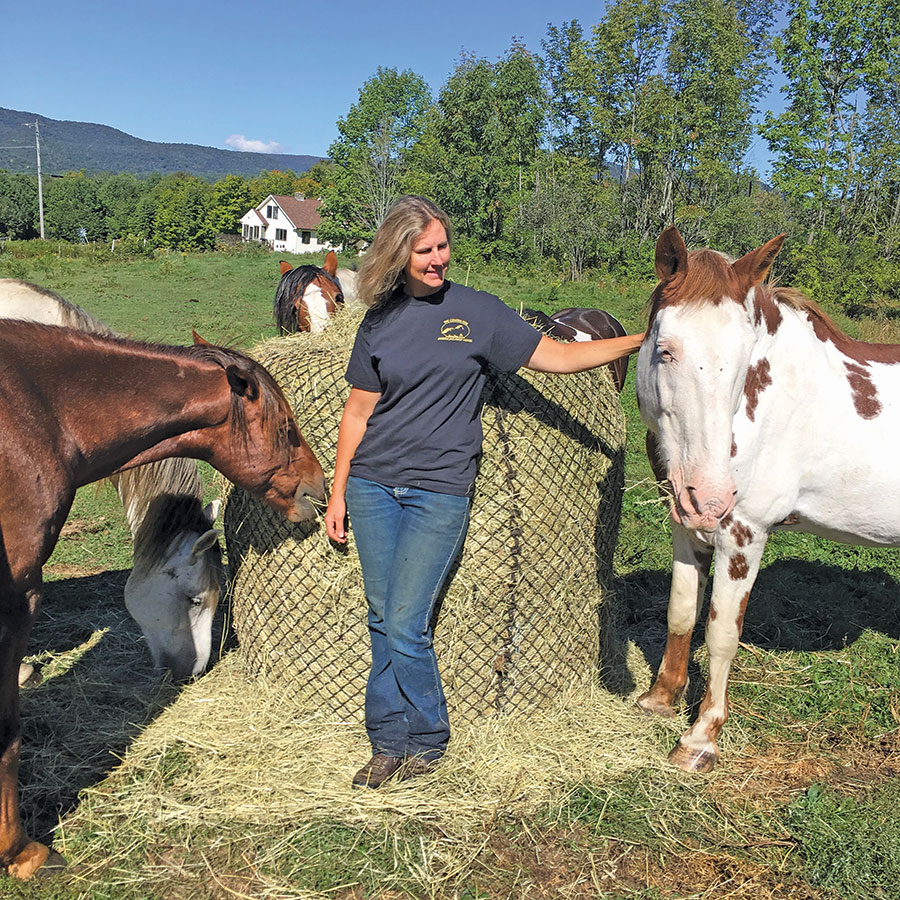More than horseplay
Stephanie Lockhart and her beloved Spanish mustangs
Stephanie Lockhart, founder of the Center for America’s First Horse in Johnson, Vermont, gives people the opportunity to work with horses to improve their lives through a method of assistance known as Equine Therapy, which is designed to help people deal with emotional challenges. These can include traumatic life experiences and PTSD. However, horses can improve the lives of anyone who spends time with them, whether they are struggling with an aspect of their life or not.
Lockhart stresses that she is not a certified equine therapist but is able to facilitate the exchange between clients and her beloved Spanish mustangs.
“Students or clients that come here get a therapeutic benefit through working with the horses,” Lockhart says. “My goals are to make the communication between a horse and a human compatible. I’m going to help somebody learn how to communicate with a horse. The result of that is that the student or client is going to walk away feeling empowered, or feeling self-confident, or feeling better about themselves. The horse is the therapist. I am just the one that bridges the gap of the communication.”
Psychologist Sheldon Siporin writes that Greg Kersten coined the term equine-assisted psychotherapy (EAP). Kersten worked with inmates and horses in a prison. He reported positive behavioral changes among inmates who did simple grooming exercises with horses. The EAP includes a mental health specialist, an equine specialist and a horse. While EAP may include riding, it often involves ground interactions with horses. Afterwards, clients process their experiences with their human therapists. Horse-assisted therapy is relatively recent, but began with therapeutic riding programs in Germany during the 1960s, according to Siporin.
One of Lockhart’s examples of the healing power of equine therapy concerned a girl who had trouble with auditory processing. “It became a learning disability for her, and until she was diagnosed she didn’t know that that’s what was going on with her, and she felt like she wasn’t smart,” Lockhart said. “She felt she had trouble socially, and it was really hard on her. Her self-esteem suffered because of it. When she started working with the horses, she was painfully shy.”
According to Lockhart, working with horses was a life-altering experience, through which the young girl gained confidence and self-esteem. “The horses just accepted her for who she was, whether she had an auditory issue or not, and over the years, she just blossomed into this very well-adjusted and confident girl who became the captain of her soccer team,” Lockhart said. “Her parents have said to me numbers of times over the years that I’ve been working with her that the horses changed her life and gave her the confidence and self-esteem she needed to become well-adjusted at school and in social situations.”
Deciding to pursue Equine Therapy has both immediate and long-lasting advantages according to Lockhart. Among those benefits is relief from anxiety. For many, working with horses has a calming effect. “They’ve come and they’ve spent time with the horses, doing something as simple as just leading them around, and learning how to set boundaries with the horse, and how to get the horse to move right or left or frontwards or backwards, just simple tasks,” Lockhart said. “What they realize doing that is that, often it’s just that maybe they haven’t set boundaries in their life, and setting boundaries with a big animal like this that will respond to you positively has given them this feeling of empowerment. Many times what I’ve heard is that the anxiety went away because they felt more in control. When you start working with the horse and you realize that you can communicate with this thousand-pound animal, it’s very empowering for you, and once these people became empowered and felt like they were heard and that they had a voice, it changed them, and they were able to take those feelings and those emotions and apply them to their regular life.”
For the people involved in Equine Therapy, the advantages do not end there. ET can enhance a person’s ability to communicate with others, especially when such communication has been difficult. “Horses will open us up to look at ourselves in ways that we haven’t been able to look at ourselves before, and it often can help that person create a dialogue maybe between their traditional therapist, so they can go back to their therapist and talk about what they felt when they were with a horse,” she said. “The healing that happens is that people start expressing themselves; so many emotional issues that people have are just kept inside and it’s lack of communication and a lack of being able to express what they’re feeling. Horses can bring that out in somebody.”
Lockhart says she has seen time and time again that working with horses can be a powerful and healing experience: “People can have incredible moments of self-awareness in working with a horse. Sometimes though, that needs to get taken one step further, where you can go and talk with somebody about what’s going on in your life. There’s been many times where people have come, and they just get with a horse, and just start crying. It’s all this built-up anxiety and they don’t know why they’re crying. The horse has given them this feeling of safety and comfort to do that, and that’s the beginning steps of being able to recover from emotional wounds.”

Senior, Interdisciplinary Studies
Grew up in Johnson, VT
Fall 2019 - Present
My favorite food is cheesecake.






